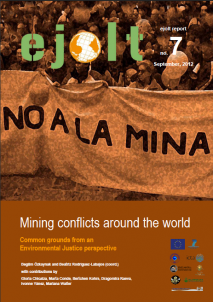
While world population increased 72 percent between 1970 and 2004, extraction of construction materials grew by 106 percent. Going beyond the buzz about decoupling the economy from natural resources use, this paper explores mining conflicts at the crossroads of de-growth and environmental justice movements. We document 24 real case studies from 18 different countries. The report has factsheets and 4 in-depth cases.
Modern economies require mining resources. But decisions on what and how much, where and how mining takes place must not be made without the consent or even against the will of those affected. Similarly, monitoring, restoration and compensation plans require prior informed consent. For detailed policy recommendations, have a look at the briefing.
This article zooms in on one of the 4 in-depth cases discussed in the report. Excerpts:
“The “discovery” of gold by Canadian mining company Dundee Precious Metals (DPM) next to the city of Krumovgrad (Bulgaria) surprised nobody. For centuries gold has been extracted here, in mines long abandoned. The surprise was for DPM, when locals didn’t really welcome the 127 million US $ they want to invest there.”
“The first plan was to use cyanide and 2.9 billion liters of water per year in an open pit mine that would create 14.6 million tons of waste rock and 7.2 million tons of tailings – all in a water stressed Natura 2000 region counting 46 percent of all Bulgarian bird species as well as half of the country’s reptile, amphibian and mammal species. In the current plan, seven years of struggle by civil society later, the only difference is that the processing with cyanide will be exported to the DPM-owned Tsumeb smelter in Namibia.”
For more information, please contact
Report author (case study Bulgaria)
Dragomira Raeva (Friends of the Earth Bulgaria) dragomira@zazemiata.org 00 3592896628808
Report coördinator
Begum Özkaynak (Boğaziçi University) begum.ozkaynak@boun.edu.tr 00 902123597630
EJOLT project dissemination
Nick Meynen (ANPED – Northern Alliance for sustainability) nick@anped.org
PDF of the press release is here

The project ENVJUSTICE has received funding from the European Research Council (ERC) under the European Union’s Horizon 2020 research and innovation programme (grant agreement No. 695446)